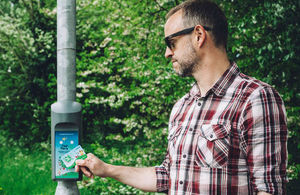Beat the Street: getting communities moving
Beat the Street energises whole communities, using a simple game to get people moving.

A man taking using radio-frequency identification as part of the Beat the Street programme.
Summary
Beat the Street is a 12-month community-wide programme which improves the health and wellbeing of entire towns and cities by getting people of all ages moving. It is evidence-based and leads to long term behaviour change by creating a social norm around walking and cycling.
What was involved
Beat the Street was created by Intelligent Health, a company dedicated to building active communities in the UK and worldwide. The programme adopts a community approach to behaviour change that is split into 3 phases: anticipation, experience and legacy.
Dr William Bird, CEO and founder of Intelligent Health who developed Beat the Street, said:
If we want to improve the health and wellbeing of the country we need to be ambitious, provide a clear narrative to get people active and support them on their journey. Physical activity has more health benefits than any other single intervention and is the means to a healthy community.
The first 3 months are spent building anticipation of the project. This involves engaging with stakeholders and communities to create champions, teams and generate excitement about the game. Knowledge is gathered on suitable walking and cycling routes, local events and amenities in order to produce a safe, effective game for the community to enjoy and feel part of.
The main Beat the Street experience lasts for up to 2 months and transforms a town into a giant playground.
Participants can pick up a Beat the Street card which contains radio-frequency identification (RFID) technology and tap them against sensors called ‘Beat Boxes’ located on lamp posts across the area. Players receive points for each box they tap and can even create or join teams which can receive prizes for tapping the most boxes; this motivates entire schools, community groups and businesses into becoming more active.
Once the game is complete, Beat the Street creates a legacy of physical activity; using the power and popularity of the game, Beat the Street will signpost people to events and activities in their area as well as working with local stakeholders to continue to build active communities.
What works well
Beat the Street projects deliver meaningful changes in population physical activity levels with more than 200,000 people participating in 2016 so far.
On average, across all Beat the Street projects, the proportion of people meeting the physical activity guidelines increased from 40% to 50%. In 2015, 1 out of every 7 adults said they were inactive at the start of Beat the Street. By the end of Beat the Street, 78% of these people reported that they had become more active. After about 6 months, we estimate that about half of the people who became more active continued to be more active.
When people were asked about the main benefits they derive from taking part in Beat the Street, ‘having fun’ and ‘exploring the local area’ consistently come up in the top 5 reported main benefits. The power of Beat the Street is the ability to deliver positive changes in health through a fun and easy programme.
Not only does Beat the Street create immediate impacts but it also creates a legacy acting as a catalyst, motivating people with the extrinsic rewards of the game, and leading to the creation of new habits.
The momentum built during the experience phase of Beat the Street is used to signpost people into continuing activity. Work continues with important stakeholders: health and transport, schools, workplaces, community groups and community champions for 6 months after the Beat the Street game phase.
Further information
Contact Intelligent Health by telephone 0118 935 7371 or email businessdevelopment@intelligenthealth.co.uk.